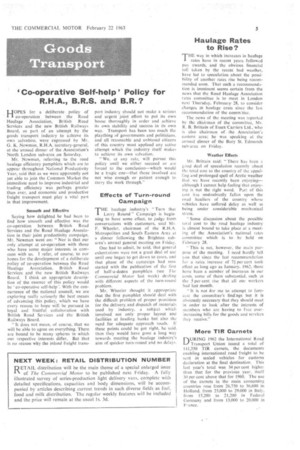Co-operative Self-help' Policy for R.H.A., B.R.S. and B.R.?
Page 7

If you've noticed an error in this article please click here to report it so we can fix it.
HOPES for a deliberate policy of co-operation between the Road Haulage Association, British Road Serviees and the new British Railways Board, as part of an attempt by the goods transport. industry to achieve its own salvation, were .'expressed by Mr. G. K. Newinan, R.H.A..Sebretary-general, at the annual dinner of the Association's North London sub-area .pn Saturday.
Mr, Newman, referring to the road haulage efficiency pamphlets Which are to appear throughout National Productivity Year, said that as we were apparently not yet able to join the Common Market the immediate need to improve industrial and trading efficiency was perhaps greater than ever, and economic and productive freight transport must play a vital part in that improvement.
Smooth and Effective
Saying how delighted he had been to find how smooth and effective was the co-operation between British Road Services and the Road Haulage Association in their joint productivity campaign, Mr. Newman went on: " Nor is that our only attempt at co-operation with those who have some major interests in common with us. I refer, of course, to our hopes for the development of a deliberate policy of co-operation between the Road Haulage Association, British Road Services and the new British 'Railways Board. I think an appropriate description of (he essence of this policy would be 'co-operative self-help With the concurrence of the national council, we are exploring really seriously the best means of advancing this policy, which we have every reason to hope will be pursued in loyal and fruitful collaboration with British Road Services and the British Railways Board.
"It does not mean, of course,, that we will be able to agree on everything. There are bound to be many spheres in which our respective interests differ. But that is no reason why the inland freight trans
port industry should not make a serious and urgent joint effort to put its own house thoroughly in order and achieve its own stability and success in its own way. Transport has been too much the plaything of governments and politicians. and all reasonable and unbiased citizens of this country must applaud any active attempt which the industry itself makes to achieve its own salvation.
"We, at any rate, will pursue this policy until we either succeed or are forced to the conclusion--which would be a tragic one—that those involved are not wise enough or patient enough to carry the Work through."
Effects of Turn-round Campaign THE haulage industry's " Turn that Lorry Round" Campaign is beginning to have some effect, to judge from conversations with customers, said Mr. F. Wheeler, Chairman of the R.H.A. Metropolitan and South Eastern Area at a dinner following the Brighton subarea's annual general meeting on Friday.
One had to admit, he said, that general exhortations were not a great deal of use until one began to get down to cases, and that phase of the campaign had now started with the publication of the first of half-a-dozen pamphlets (see The Commercial Motor last week) dealing with different aspects of the turn-round problem.
Mr. Wheeler thought it appropriate that the first pamphlet should deal with the difficult problem of proper provision for the delivery and dispatch of materials used by industry, a subject which involved not only proper layout and facilities at loading banks but, also the need for adequate approach roads. If these points could be got right, he said, then they would have gone a long way towards meeting the haulage industry's aim of quicker turn-round and no delays.












































































































